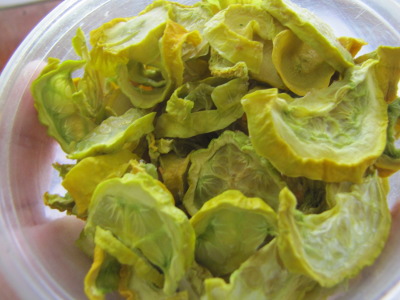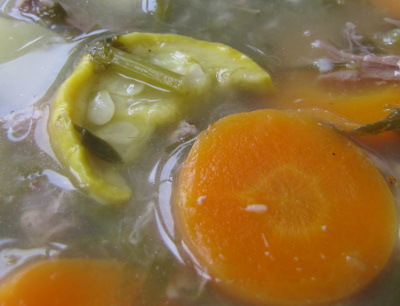
How to dry summer squash
 Summer squash will
freeze, but the vegetable turns mushy and is really only appropriate to
hide within tomato sauces and soups afterward. Since our glut of
summer squash is already beginning, I decided to see if they would dry
any better.
Summer squash will
freeze, but the vegetable turns mushy and is really only appropriate to
hide within tomato sauces and soups afterward. Since our glut of
summer squash is already beginning, I decided to see if they would dry
any better.
For most vegetables,
including summer squash, you'll end up with much better results if you
blanch before drying. To blanch, place cut up squash in a covered
steamer above a pot of boiling water for a couple of minutes, stirring
as necessary, until the colors turn bright. (This is the same way
you blanch before
freezing.)
If you want to make
squash chips, sprinkle some salt on your blanched squash. I've
been told that squash chips make a healthy and delicious snack, which I
can believe from nibbling on an unsalted chip, but we opted to dry
without salting so that the squash would be appropriate for winter main
dishes.
Then dehydrate your
squash at 125 degrees Fahrenheit for up to 12 hours. I wasn't
very careful to cut my slices all the same thickness, so I took out
about half the squash after 5 hours, another quarter at 6 hours, and
the final set at 7 hours. Your squash is dry if it's crispy in
consistency with no damp pockets that give between your fingers.
You'll soon be able to tell whether squash is dry at a brief touch.
 We'll store our dried veggies
in the freezer while there's space, then
move them to the fridge in late summer when iced accommodations get
scarce. I
figure one cup of dried squash is equivalent to maybe 4 cups of frozen
squash, so even if we kept the squash in the freezer full time, we'd be
ahead of
the game.
We'll store our dried veggies
in the freezer while there's space, then
move them to the fridge in late summer when iced accommodations get
scarce. I
figure one cup of dried squash is equivalent to maybe 4 cups of frozen
squash, so even if we kept the squash in the freezer full time, we'd be
ahead of
the game.
We tested our dried
crooknecks in a soup and decided that the flavor was much better dried
than frozen, nearly as good as fresh. A definite success, and our
new method of saving summer squash for the cold months.
Want more in-depth information? Browse through our books.
Or explore more posts by date or by subject.
About us: Anna Hess and Mark Hamilton spent over a decade living self-sufficiently in the mountains of Virginia before moving north to start over from scratch in the foothills of Ohio. They've experimented with permaculture, no-till gardening, trailersteading, home-based microbusinesses and much more, writing about their adventures in both blogs and books.
Want to be notified when new comments are posted on this page? Click on the RSS button after you add a comment to subscribe to the comment feed, or simply check the box beside "email replies to me" while writing your comment.

Phil --- Anything's got to be better than those breaking and entering charges you get when you sneak into your neighbor's house to leave zucchini on his table...
Sarah --- It's not really a "recipe", so much as throwing together whatever I have on hand. My July ebook actually tells a lot about my soup philosophy, and so does my post about harvest catch-all soup. This particular soup was okay, but not great, and consisted of a base of homemade chicken stock simmered for a few hours with as many potato onions as I could trick myself into cleaning (about a handful), most of a head of garlic, a big handful of parsley, and the last chunk of 1.5 year old venison out of the freezer. About forty-five minutes before eating, I tossed in four big carrots, about an equal volume of potatoes, and some salt and pepper. Then, fifteen minutes before eating, I threw in some green beans, amaranth, and the summer squash, turned off the heat, and left the lid on to allow the last ingredients to cook while the soup cooled to eating temperature. The soup was only okay because I didn't put in enough onions, so it wasn't as sweet as I like it, and since I added a bit too much water and stretched the chicken stock too far. Live and learn!
Homemade --- Dried vegetables don't usually spoil so much as slowly lose nutrients and flavor. You can keep them on a shelf in a dark spot for up to a year if you play all of your cards right, but the odds are stacked against that kind of storage for us because of our humid environment and because I choose not to use sulfur or any of the other preservatives. Luckily, dried vegetables don't go bad in any way that will hurt you, so you can experiment with the best way to store them in your house without any fear of botulism or other scares. Just smell or taste one before using them, and if it's moldy or lacks flavor, toss it out and store a different way next year.